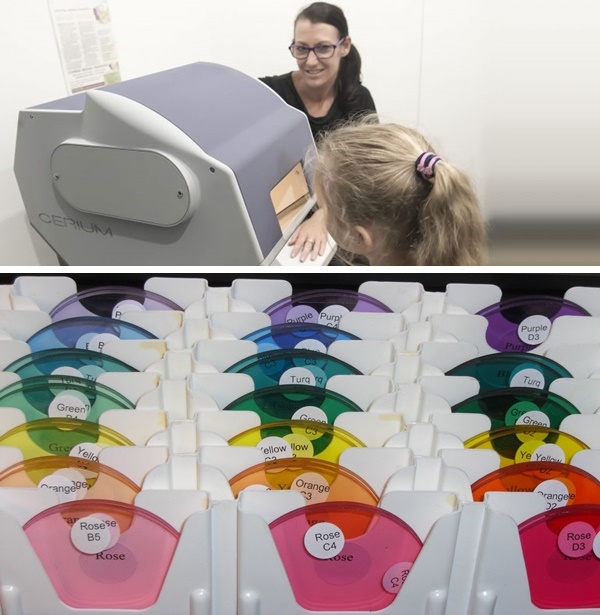Other Services
Other Services
Visual Stress & Coloured Lenses
A percentage of the population is sensitive to black print on a white page, creating distortion whist reading and affecting their ability to learn and concentrate. Precision tinted lenses assist by alleviating the symptoms.
Symptoms of vision stress – all or some of:
- Movement of print
- Blurring of print
- Letters changing shape or size
- Letters fading or becoming darker
- Patterns appearing, sometimes describes as “worms” or “rivers” running through print
- Illusions of colour – blobs of colour on the page or colours surrounding letters or words
- Rapid tiring
- Headache, migraine or eyestrain
We use the Intuitive Colorimeter to determine the best precision colour tint to reduce visual sensitivity. The precision of the colorimetry instrument is used in conjunction with behavioural optometry techniques to achieve optimum results.
We do not diagnose dyslexia or attention deficit disorder, but where appropriate we can recommend strategies to minimise associated symptoms and difficulties.
Some people are more photosensitive than others, colour effect has been associated with metabolic and mitochondrial conditions such as migraines and fatigue syndromes. It is postulated that precision tinted lenses can reduce hyper-activation in the visual cortex of the brain.

Hypersensitive Eyes & Vision
Our practice is known for assisting people with sensitive visual systems who are not comfortable with their vision or how their eyes feel or perform. We look beyond regular eyesight testing to help manage symptoms.
Your symptoms may include:
- Eyes and vision not feeling ‘just right’- not connected
- Glare sensitivity, problems with bright or fluorescent light
- Rapid eye fatigue
- Difficulty reading for long periods of time
- Shadowing or slight doubling of vision
- More dry eyes, sore eyes and headaches
The emphasis is greater than your letter chart ability or what your conventional glasses prescription may be. Comprehensive binocular vision testing assesses vergences, heterophoria, pursuits and saccades. These measurements give insight to the spatial elements of vision: how you move through space or how you localise where to look.
Our clients are more prone to dizziness, sinus, migraines, anxiety and often have a history of TBI or medical issues.
We use prisms, tints, filters and vision therapy to reduce and manage symptoms. Multi-disciplinary care is important, with other healthcare practitioners involved as there are often non visual complaints to consider. Lifestyle factors and interventions are often key to getting better and performing the best you can.


